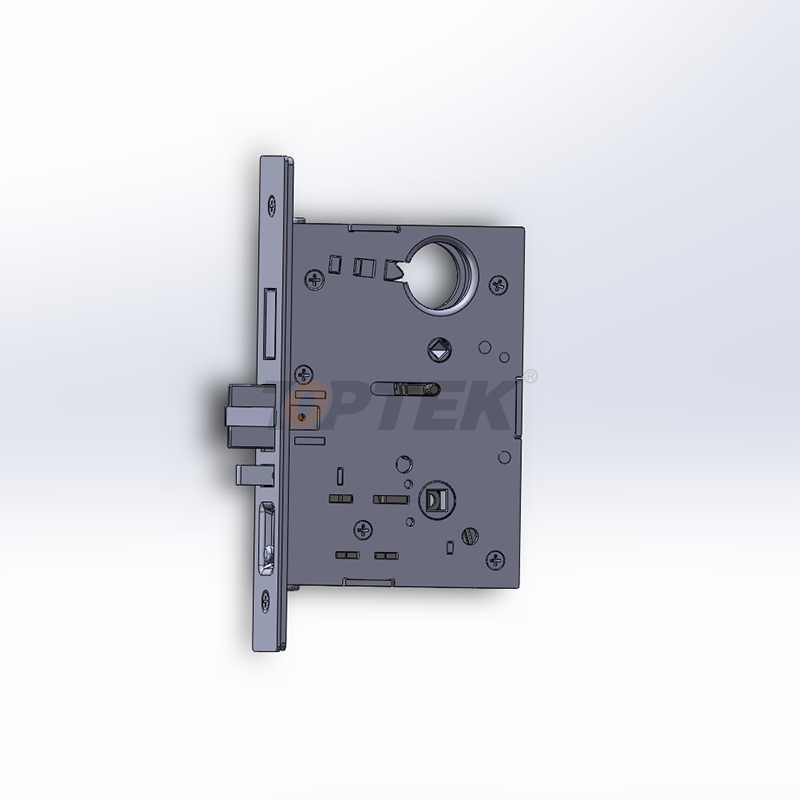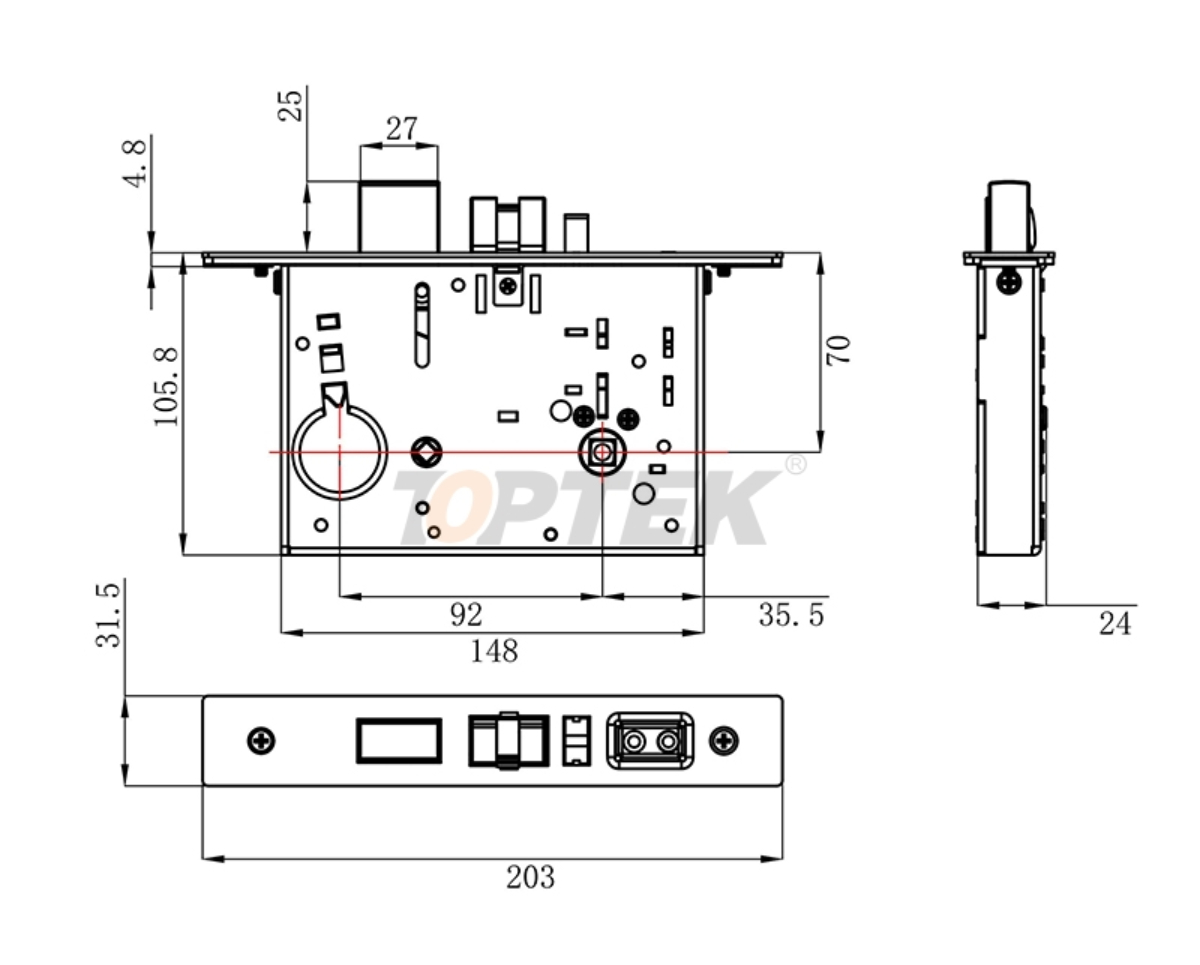Grade 2 cylindrical locks strike the perfect balance between security, durability, and cost-effectiveness for commercial and residential applications that need more protection than basic hardware can provide. These locks meet stringent ANSI/BHMA standards for cycle testing, strength, and security performance, making them ideal for medium-traffic areas like offices, retail spaces, and high-end homes.
Unlike Grade 3 locks that may fail under heavy use or Grade 1 locks that often exceed budget requirements, Grade 2 cylindrical locks deliver reliable security for demanding applications without unnecessary complexity or expense. They withstand hundreds of thousands of operating cycles while resisting common attack methods, providing peace of mind for property owners who need dependable access control.
This comprehensive guide examines the top Grade 2 cylindrical locks available today, helping you understand key features, security considerations, and installation requirements. You'll discover which models excel in specific applications and learn how to select locks that meet your security needs while staying within budget constraints.
Grade 2 Cylindrical Lock Standards
The American National Standards Institute (ANSI) and Builders Hardware Manufacturers Association (BHMA) establish rigorous testing standards that Grade 2 cylindrical locks must meet. These standards evaluate locks across multiple performance categories including operational testing, strength testing, and security testing.
Grade 2 locks must complete 400,000 operating cycles without failure, demonstrating their suitability for medium-traffic commercial applications. They must also withstand specific impact forces and torque loads that simulate real-world attack attempts and accidental damage.
Security testing includes resistance to picking, bumping, and drilling attacks. While not as robust as Grade 1 locks, Grade 2 models provide substantial protection against common bypass methods used by opportunistic intruders.
The cylindrical design integrates the locking mechanism directly into the lock body, eliminating the separate deadbolt housing required by mortise locks. This streamlined construction reduces installation complexity while maintaining security performance suitable for most medium-security applications.


Security Features and Performance
Grade 2 cylindrical locks incorporate several security features that provide substantial protection against common attack methods while remaining practical for daily use.
Cylinder security represents a critical component, with quality Grade 2 locks utilizing hardened pins, reinforced keyways, and precision tolerances that resist picking and bumping attempts. Many models include additional security pins or specialized pin configurations that increase bypass difficulty.
Strike reinforcement prevents door frame damage during forced entry attempts. Quality cylindrical locks include reinforced strike plates with longer mounting screws that distribute impact forces across larger frame areas.
Anti-drill features protect critical lock components from attack. Hardened steel inserts, drill-resistant plates, and strategic component placement make drilling attacks time-consuming and often unsuccessful.
Cylinder retention systems prevent cylinder removal without proper authorization. These systems resist pulling and twisting attacks that attempt to extract the cylinder for bypass or analysis.
Installation and Compatibility Considerations
Proper installation ensures Grade 2 cylindrical locks perform to their rated specifications while maintaining warranty coverage and optimal security.
Door preparation requirements typically follow industry standards with 2-1/8 inch diameter holes for the lock body and 1 inch diameter holes for the cylinder. Standard backset measurements of 2-3/8 inches or 2-3/4 inches accommodate most door configurations.
Frame preparation must provide adequate support for the strike plate and latch bolt. Reinforced strike plates with longer screws improve security and distribute loads properly during normal operation and attack attempts.
Existing door compatibility often allows direct replacement of older cylindrical locks without modification. However, verify hole alignments and backset measurements before ordering to avoid installation complications.
Professional installation ensures proper adjustment and operation while maintaining warranty coverage. Many manufacturers require professional installation for commercial applications or void warranties for improper installation.
Maintenance and Longevity
Grade 2 cylindrical locks require minimal maintenance when properly installed and operated within their design parameters. Regular maintenance extends service life and maintains security performance.
Lubrication schedules should follow manufacturer recommendations, typically involving light graphite application to cylinder mechanisms and occasional lubrication of moving parts. Avoid oil-based lubricants that attract dirt and debris.
Key management practices protect cylinder security and extend lock life. Avoid excessive force when operating locks, and replace worn keys before they damage cylinder pins or keyways.
Environmental considerations affect maintenance requirements and service life. Locks exposed to weather, salt air, or industrial contaminants may require more frequent service and specialized finishes or materials.
Replacement part availability varies by manufacturer and model. Choose locks from manufacturers with strong parts support and service networks to ensure long-term serviceability.
Cost-Benefit Analysis
Grade 2 cylindrical locks provide excellent value by delivering robust security and durability at moderate cost. Initial investment typically pays dividends through reduced maintenance, longer service life, and improved security compared to lower-grade alternatives.
Labor costs for installation remain reasonable due to standard door preparations and straightforward installation procedures. Most commercial locksmiths can install Grade 2 cylindrical locks efficiently without specialized tools or extensive modifications.
Lifecycle costs favor quality Grade 2 locks over cheaper alternatives that require frequent replacement or generate security incidents. The robust construction and proven reliability reduce total cost of ownership over extended periods.
Security benefits often justify the premium over Grade 3 locks, particularly in applications where property values or liability concerns make adequate security essential. The improved pick resistance, drill protection, and operational durability provide tangible security improvements.

Application-Specific Recommendations
Different applications benefit from specific Grade 2 cylindrical lock features and models that match their unique requirements and operating conditions.
Office environments typically benefit from locks with smooth operation, professional appearance, and master key compatibility. Models with adjustable backsets accommodate various door constructions common in commercial buildings.
Retail applications require locks that balance security with frequent operation. Heavy-duty internal mechanisms and reinforced components handle constant use while maintaining security against opportunistic attacks.
Educational facilities need locks that provide security without complexity. Classroom function locks and institutional features help manage access while meeting emergency egress requirements.
Healthcare facilities require locks that accommodate frequent cleaning and meet infection control standards. Antimicrobial finishes and smooth surfaces facilitate sanitation while maintaining security performance.
Your Path to Enhanced Security
Grade 2 cylindrical locks represent the optimal choice for applications requiring reliable security, durability, and professional performance without the complexity and expense of highest-grade alternatives. The models discussed in this guide have proven themselves across thousands of installations in demanding commercial and residential applications.
Success with Grade 2 cylindrical locks depends on selecting the right model for your specific requirements, ensuring proper installation, and maintaining the locks according to manufacturer recommendations. Take time to evaluate your security needs, door configurations, and operational requirements before making your final selection.
Consider consulting with a commercial locksmith or security professional to verify your lock selection and ensure proper integration with your overall security strategy. Their expertise can help you avoid common pitfalls and maximize the security benefits of your Grade 2 cylindrical lock investment.
Grade 2 Cylindrical Locks
Cylindrical Locks
Grade 2 Commercial Lock
English
العربية
Français
Русский
Español
Português
Deutsch
italiano
日本語
한국어
Nederlands
Tiếng Việt
ไทย
Polski
Türkçe
አማርኛ
ພາສາລາວ
ភាសាខ្មែរ
Bahasa Melayu
ဗမာစာ
தமிழ்
Filipino
Bahasa Indonesia
magyar
Română
Čeština
Монгол
қазақ
Српски
हिन्दी
فارسی
Kiswahili
Slovenčina
Slovenščina
Norsk
Svenska
українська
Ελληνικά
Suomi
Հայերեն
עברית
Latine
Dansk
اردو
Shqip
বাংলা
Hrvatski
Afrikaans
Gaeilge
Eesti keel
Māori
සිංහල
नेपाली
Oʻzbekcha
latviešu
অসমীয়া
Aymara
Azərbaycan dili
Bamanankan
Euskara
Беларуская мова
भोजपुरी
Bosanski
Български
Català
Cebuano
Corsu
ދިވެހި
डोग्रिड ने दी
Esperanto
Eʋegbe
Frysk
Galego
ქართული
guarani
ગુજરાતી
Kreyòl ayisyen
Hausa
ʻŌlelo Hawaiʻi
Hmoob
íslenska
Igbo
Ilocano
Basa Jawa
ಕನ್ನಡ
Kinyarwanda
गोंगेन हें नांव
Krio we dɛn kɔl Krio
Kurdî
Kurdî
Кыргызча
Lingala
Lietuvių
Oluganda
Lëtzebuergesch
Македонски
मैथिली
Malagasy
മലയാളം
Malti
मराठी
ꯃꯦꯇꯥꯏ (ꯃꯅꯤꯄꯨꯔꯤ) ꯴.
Mizo tawng
Chichewa
ଓଡ଼ିଆ
Afaan Oromoo
پښتو
ਪੰਜਾਬੀ
Runasimi
Gagana Samoa
संस्कृत
Gaelo Albannach
Sepeti
Sesotho
chiShona
سنڌي
Soomaali
Basa Sunda
Wikang Tagalog
Тоҷикӣ
Татарча
తెలుగు
ትግንያውያን
Xitsonga
Türkmençe
संस्कृत
ئۇيغۇرچە
Cymraeg
isiXhosa
ייִדיש
Yorùbá
isiZulu








































